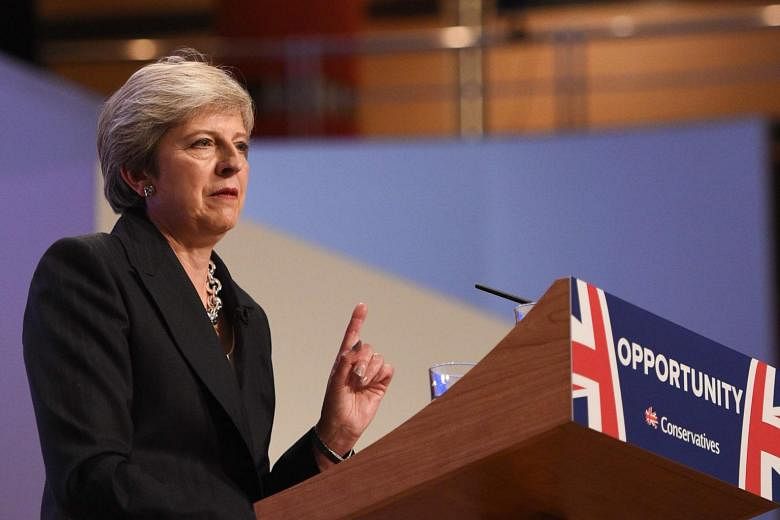BIRMINGHAM (REUTERS) - British Prime Minister Theresa May called on her Conservative Party on Wednesday (Oct 3) to pull together and unite behind her plan to leave the European Union, saying "if we hold our nerve" she can win a deal "that delivers for Britain".
On the final day of her party's conference, Mrs May rallied members, trying to address their concerns that the Conservatives are becoming increasingly directionless under the weight of Brexit by calling on them to look to a brighter future.
Dancing onto the stage in the city of Birmingham to Abba's Dancing Queen to a standing ovation, Mrs May poked fun at herself after her dance moves were mocked on a trip to Africa and after last year's conference when her speech was disrupted by a coughing fit, a stage intruder and a disintegrating set.
It was a warm welcome for a leader, whose fragile position was put under further pressure after the EU rejected parts of her so-called Chequers plan and critics stepped up calls for her to rethink her strategy for Brexit, Britain's biggest trade and foreign policy shift for more than 40 years.
But with just six months before Britain is due to leave the bloc, she has so far weathered the Brexit storm, shrugging off a barnstorming speech by her former foreign minister Boris Johnson, which did little to hide his leadership ambitions.
"If we all go off in different directions in pursuit of our own vision of the perfect Brexit, we risk ending up with no Brexit at all," she said in a clear nod to eurosceptic lawmakers who have published their alternatives plan for leaving the EU.
"And there's another reason why we need to come together. We are entering the toughest part of the negotiations... What we are proposing is very challenging for the EU. But if we stick together and hold our nerve I know we can get a deal that delivers for Britain."
She also tried to expand her domestic agenda, attacking the main opposition Labour Party by saying their policies, including the renationalisation of mail, rail and utilities, would mean increased taxes and drive away business.
Labour leader Jeremy Corbyn, she said, would "outsource our conscience to the Kremlin".
Her words were aimed at easing the growing frustration of some Conservatives who openly say their party is directionless, unable to set an agenda against the divisive rows over Brexit between competing wings of the party.
DIVISIONS
The pressure she is under from some in the party was underlined less than an hour before she was due to speak when Conservative lawmaker James Duddridge said he had submitted a letter to the party's so-called 1922 committee, calling on her to resign. Forty-eight lawmakers would need to write such letters to trigger a vote of confidence in the leader.
"Turns out there is a plan. That plan is Boris," Mr Duddridge wrote on Twitter after Mr Johnson's speech on Tuesday.
But in that speech, Mr Johnson seemed to pull his punches, backing Mrs May for now while making a rallying cry for the party to return to its traditional values and to "chuck Chequers" in a sign of his leadership ambitions.
Taking a swipe at Mr Johnson, Mrs May said she was taking decisions on Brexit in the "national interest", pressing her argument that her former foreign secretary's alternative Brexit proposals would tear the United Kingdom apart.
"It is no surprise that we have had a range of different views expressed this week," she said.
"But my job as prime minister is to do what I believe to be in the national interest. And that means two things. First, honouring the result of the referendum... and secondly, to seek a good trading and security relationship with our neighbours after we have left."
With no agreement with the bloc over the divorce or a future relationship, the last day of the conference marks the beginning of what some officials predict will be a frenzied couple of weeks of diplomacy between London and Brussels as the two sides try to secure a deal to end more than 40 years of partnership.
Mrs May and her team face weeks of difficult conversations with Brussels to win a deal, but she also faces challenges from inside her own party and from her partners in Parliament, Northern Ireland's Democratic Unionist Party (DUP).
DUP leader Arlene Foster has used the conference to loudly set out her red lines for Brexit, repeating that she will not accept a border between Northern Ireland and the rest of the United Kingdom.
"The red line is blood red," she told the BBC.
In her speech, Mrs May again stuck to her Chequers plan, named after her country residence where she hashed out an agreement over the proposals in July.
"So this is our proposal. Taking back control of our borders, laws and money. Good for jobs, good for the Union. It delivers the referendum, it keeps faith with the British people," she said. "It is in the national interest."

